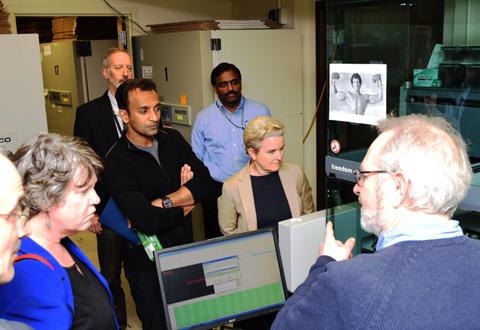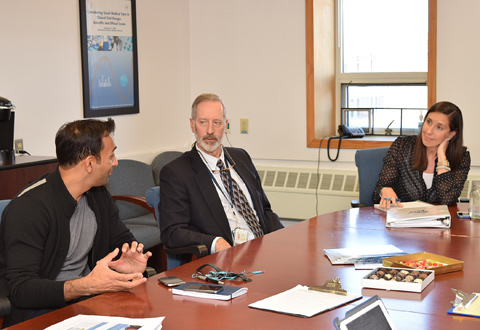VA New England Healthcare System
President’s chief data scientist visits VA Boston research program

President’s chief data scientist visits VA Boston
BOSTON – The White House chief data scientist visited the Department of Veterans Affairs Office of Research & Development’s Million Veteran Program (MVP) at the VA Boston Health System’s Jamaica Plain campus March 31, 2015.
DJ Patil, Ph.D., deputy chief technology officer for data policy, and chief data scientist with the Office of Science and Technology Policy (OSTP) at the White House, is working on President Obama’s Precision Medicine Initiative (PMI). Hopefully, the initiative will pioneer a new model of patient-powered research that promises to accelerate biomedical discoveries and provide clinicians with new tools, knowledge, and therapies to select which treatments will work best for which patients.
Advances in precision medicine have already led to powerful new discoveries and several new treatments that are tailored to specific characteristics of individuals, such as a person’s genetic makeup, or the genetic profile of an individual’s tumor. "A priority for OSTP is how we think about data and health care, and how to responsibly unleash the power of data to benefit the public,” said Patil.
MVP, a nation-wide VA research program, recently enrolled its 360,000th volunteer and seeks to register one million veterans. MVP has established one of the largest genetic and health databases, including information about military exposure, lifestyle, and health in the world.
PMI and MVP, two cutting-edge programs, are similar because they are centered on the ideas of collecting data from one million research volunteers, responsibly sharing knowledge, and improving health care.
PMI has allocated $130 million to the National Institutes of Health (NIH) to develop of a voluntary national research group of a million or more volunteers to propel the understanding of health and disease and set the foundation for a new way of doing research through engaged participants and open, responsible data sharing.
Patil said that collecting data for one million research volunteers is going to be a challenging project for OST and that’s why he came to meet with people at the VA who are already doing it.

President's Precision Medicine Initiative comes to Boston
Patil visited MVP to ask questions about how the program could be used as a potential model for PMI. The data collected with MVP will be an important and valuable resource for researchers as they learn more about the relationship between genes and common diseases, such as cancer, diabetes, and heart disease, along with military-related illnesses such as PTSD.
“We are proud and excited to share what we’ve learned from implementing the Million Veteran Program with Dr. Patil. We are doing our part for the Precision Medicine Initiative as well as other programs that focus on personalized medicine,” said J. Michael Gaziano, M.D., M.P.H., principal investigator, Million Veteran program, based at the VA Boston Healthcare System.
Research programs like MVP are an important part of the Veterans Health Administration’s efforts to deliver personalized, proactive, patient-driven health care to veterans. Findings from MVP may help answer questions as to why some treatment may work well for some veterans but not for others, and why some may be at a greater risk for developing an illness.
















